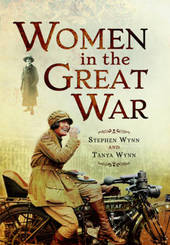
|
Women in the Great War
Paperback / softback
Main Details
| Title |
Women in the Great War
|
| Authors and Contributors |
By (author) Stephen Wynn
|
| Physical Properties |
| Format:Paperback / softback | | Pages:144 | | Dimensions(mm): Height 234,Width 156 |
|
| Category/Genre | First world war |
|---|
| ISBN/Barcode |
9781473834149
|
| Classifications | Dewey:940.30820941 |
|---|
| Audience | |
|---|
| Illustrations |
176 pages of integrated illustrations
|
|
Publishing Details |
| Publisher |
Pen & Sword Books Ltd
|
| Imprint |
Pen & Sword Military
|
| NZ Release Date |
19 February 2018 |
| Publication Country |
United Kingdom
|
Description
The First World War was fought on two fronts. In a military sense it was fought on the battlefields throughout Europe, the Gallipoli peninsular and other such theatres of war, but on the Home Front it was the arduous efforts of women that kept the country running. Before the war women in the workplace were employed in such jobs as domestic service, clerical work, shop assistants, teachers or as barmaids. These jobs were nearly all undertaken by single women, as once they were married their job swiftly became that a of a wife, mother and home maker. The outbreak of the war changed all of that. Suddenly, women were catapulted into a whole new sphere of work that had previously been the sole domain of men. Women began to work in munitions factories, as nurses in military hospitals, bus drivers, mechanics, taxi drivers, as well as running homes and looking after children, all whilst worrying about their men folk who were away fighting a war in some foreign clime, not knowing if they were ever going to see them again. With the work came a wage, which provided women with financial freedom for the first time, as well as an element of independence and social integration, which they would have possibly never otherwise experienced. Women were not paid the same wages as men for doing the same work, but what they did earn was much more than they had ever earned before. This was also a time of the suffrage movement, who wanted more out of life for women. Accordingly, some of these women were reluctant to stop working, with some of these being sacked so that returning soldiers could have their pre-war jobs back. Whilst, tens of thousands of women were left widowed, many with young children to bring up. Despite all of this, one thing was for sure, for lots of women there was no going back to how things had been before the war. There was only going to be one way, and that was forward. AUTHORS: Stephen and Tanya Wynn are a husband and wife team who are collaborating for the first time with this title. They have been married for twelve years and outside of writing enjoy the simplicities of life. They spend most mornings walking their four German Shepherd dogs at a time when most normal people are still sound asleep. Tanya has always taken a keen interest in the previous titles Stephen has written, so much so that the title for this book was her idea.
Author Biography
Stephen and Tanya Wynn are a husband and wife team who are collaborating for the first time with this title. They have been married for twelve years and outside of writing enjoy the simplicities of life. They spend most mornings walking their four German Shepherd dogs at a time when most normal people are still sound asleep. Tanya has always taken a keen interest in the previous titles Stephen has written, so much so that the title for this book was her idea.
Reviews"I've read stories in magazines and novels about how men returning from action on the Western Front and elsewhere during WW1 returned home to find their jobs taken by women. Stephen and Tanya Wynn take us back four years to the time when the decisions were taken that the women left behind were given the task of keeping vital industries running, particularly agriculture but also in arms and equipment manufacture for the BEF. Superlative social history from Pen and Sword."-- "Books Monthly"
|